#Generative AI In Software Development
Explore tagged Tumblr posts
Text
The Future of Coding: Generative AI in Software Development
Generative AI and large language models (LLMs) are not entirely novel technologies, but their significance became widely recognized with the introduction of ChatGPT by OpenAI.
The remarkably human-like capabilities of ChatGPT captivated the public’s interest, sparking discussions about concerns such as the potential for misinformation, biases, and the conceivable replacement of human roles, including that of software developers. Here, Generative AI software development certification brings new revolutions for engineers.
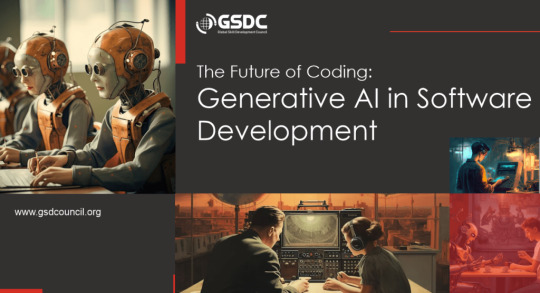
0 notes
Text
At Upcore Technologies, we believe in harnessing the power of generative AI to revolutionize software development. This transformative technology is enabling us to streamline the development process, turning complex ideas into high-quality, efficient code with greater speed and accuracy. By integrating generative AI into our workflows, we can automate routine coding tasks, optimize software designs, and significantly reduce development time—all while enhancing the overall quality of the final product. Generative AI helps our team of developers focus on more strategic, innovative tasks, while the AI handles repetitive coding and debugging, allowing for faster iteration and improved collaboration. From automating code generation to real-time analysis and testing, AI tools are transforming the way we approach software development, ensuring that our solutions are not only efficient but also reliable and scalable. At Upcore, we leverage this cutting-edge technology to create software that meets the highest standards of quality and performance. As generative AI continues to evolve, we remain committed to staying at the forefront of innovation, continuously improving our development processes and delivering top-notch software solutions that drive success for our clients. With AI-powered development, we are shaping the future of software, creating smarter, more efficient applications that meet the demands of an ever-changing digital landscape.
0 notes
Text
What is the role of GenAI in the Software Development Life Cycle(SDLC)?
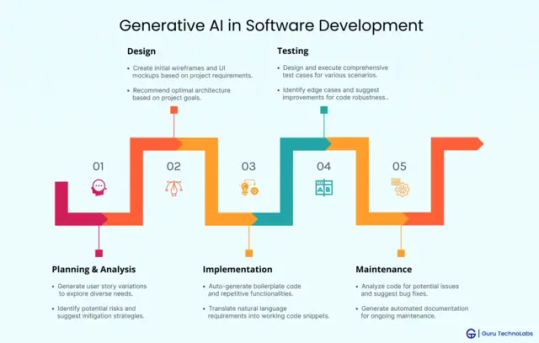
The Software Development Life Cycle (SDLC) is a structured process used by software developers to design, develop, test, and deploy software applications. The SDLC typically comprises several stages: requirement analysis, system design, development, testing, deployment, and maintenance. Each phase plays a crucial role in ensuring the software meets the desired quality standards and user requirements.
Adding GenAI to the SDLC has many advantages like improved efficiency, precision, and speed. GenAI can automate routine tasks, create new solutions, and offer predictive insights, changing the way software is created, tested, and managed. This helps organizations release top-notch software quicker and more affordably.
Get better understanding with Generative AI vs Traditional AI to help you get knowledge on the software development lifecycle.
Evolution of AI in Software Development
Generative AI refers to AI systems designed to generate new content or solutions by learning from existing data. In software development, GenAI can create code, design software architectures, generate test cases, and even simulate user interactions. These capabilities make GenAI a powerful tool for automating and enhancing various stages of the SDLC.
AI has evolved significantly in software development, starting from simple rule-based systems to advanced machine learning models. Initially, AI was used for automating basic tasks and providing decision support. With the advent of machine learning and neural networks, AI has become more sophisticated, enabling developers to leverage GenAI for complex tasks such as code generation, automated testing, and predictive maintenance.
Stages of SDLC and the Role of GenAI
Requirement Analysis
Benefits of Using GenAI for Requirement Gathering
GenAI can analyze vast amounts of data to identify user needs and requirements accurately. By processing user feedback, market trends, and historical data, GenAI can generate comprehensive requirement documents, reducing the time and effort required for manual analysis.
Example Use Cases
For instance, a GenAI system can analyze customer reviews and support tickets to identify common pain points and feature requests. This information can then be used to prioritize requirements and ensure the final product meets user expectations.
System Design
GenAI in Designing Software Architecture
Generative AI in Software Development can assist in designing software architecture by generating design patterns and suggesting optimal system structures. It can analyze existing architectures, identify potential improvements, and provide recommendations for designing scalable and efficient systems..
Tools and Techniques
Various tools, such as deep learning frameworks and design pattern generators, leverage GenAI to automate the system design process. These tools can create architectural diagrams, generate code templates, and suggest best practices for software design.
Development
How GenAI Automates Coding and Development Tasks
GenAI can automate coding tasks by generating code snippets, completing functions, and even creating entire modules based on high-level specifications. This accelerates the development process and ensures consistency and accuracy in the codebase.
Case Studies of GenAI in Action
Several companies have successfully implemented GenAI in their development workflows. For example, OpenAI's Codex can generate code in various programming languages based on natural language inputs, significantly reducing the time developers spend on writing boilerplate code.
Testing
Enhancing Software Testing with GenAI
Generative AI in SDLC enhances software testing by generating test cases, predicting potential bugs, and automating test execution. It can analyze code changes and suggest relevant test scenarios, ensuring comprehensive test coverage.
Automated Testing Tools Powered by GenAI
Tools like Testim and Applitools use GenAI to automate visual testing, regression testing, and end-to-end testing. These tools can identify UI discrepancies, detect functional issues, and ensure the software meets quality standards.
Deployment
Streamlining Deployment Processes with GenAI
Generative AI in Software Development streamlines deployment processes by automating configuration management, continuous integration, and continuous delivery. It can predict deployment risks, optimize resource allocation, and ensure seamless software releases.
Real-World Applications
Companies like Netflix use GenAI to manage their deployment pipelines. GenAI systems monitor deployment processes, identify potential issues, and automatically roll back changes if necessary, ensuring high availability and reliability.
Maintenance
GenAI in Software Maintenance and Updates
Generative AI in SDLC plays a crucial role in software maintenance by predicting issues before they occur, automating bug fixes, and suggesting updates. It can analyze system logs, user feedback, and performance metrics to identify areas for improvement.
Predictive Maintenance with AI
Predictive maintenance powered by GenAI helps organizations anticipate hardware failures, optimize system performance, and reduce downtime. By analyzing historical data and usage patterns, GenAI can provide actionable insights for proactive maintenance.
Benefits of Implementing GenAI in SDLC
Improved Efficiency and Productivity
GenAI automates repetitive tasks, allowing developers to focus on high-value activities. This leads to increased productivity and faster development cycles.
Enhanced Accuracy and Reduced Errors
By leveraging GenAI's predictive capabilities, developers can minimize errors and ensure higher accuracy in code and design. GenAI can detect potential issues early, reducing the risk of defects in the final product.
Cost Reduction
Automating various stages of the SDLC with GenAI reduces the need for manual intervention, leading to significant cost savings. Organizations can allocate resources more effectively and reduce development and maintenance costs.
Accelerated Time-to-Market
GenAI accelerates the software development process by automating tasks, generating code, and providing predictive insights. This enables organizations to bring products to market faster and respond to changing market demands more effectively.
Challenges and Considerations
Technical Challenges
Integrating Generative AI in SDLC requires technical expertise and a robust infrastructure. Organizations must address challenges related to data quality, model training, and system integration to fully leverage Generative AI's capabilities.
Ethical and Legal Considerations
The use of GenAI raises ethical and legal concerns, such as data privacy, algorithmic bias, and intellectual property rights. Organizations must establish clear guidelines and ensure compliance with relevant regulations to mitigate these risks.
Ensuring Security and Privacy
GenAI systems must be designed with security and privacy in mind. Protecting sensitive data, ensuring secure model training, and preventing unauthorized access are critical considerations for deploying GenAI in the SDLC.
Conclusion
Generative AI plays a transformative role in the Software Development Life Cycle, offering numerous benefits such as improved efficiency, accuracy, and cost reduction. By automating tasks, generating innovative solutions, and providing predictive insights, Generative AI enhances every stage of the SDLC, from requirement analysis to maintenance.
However, organizations must address technical, ethical, and security challenges to fully realize the potential of Generative AI in software development. As the technology continues to evolve, the integration of Generative AI in SDLC is set to become a standard practice, driving innovation and improving software quality across industries.
0 notes
Text
Transforming Code Creation: The Emergence of Generative AI, in the Field of Software Development
It explores the revolutionary impact of generative artificial intelligence technologies on the process of writing and developing software. This narrative delves into how AI models, capable of generating code from natural language descriptions, are reshaping the landscape of software development. It highlights the efficiencies gained, such as reduced coding time and lower barriers to entry for non-expert programmers, while also addressing the challenges, including concerns about code quality, security, and the need for rigorous validation. The emergence of generative AI signifies a paradigm shift, promising to accelerate innovation, enhance productivity, and democratize access to software development, yet it also necessitates new frameworks for collaboration between humans and machines in the creative process of coding. Read More!
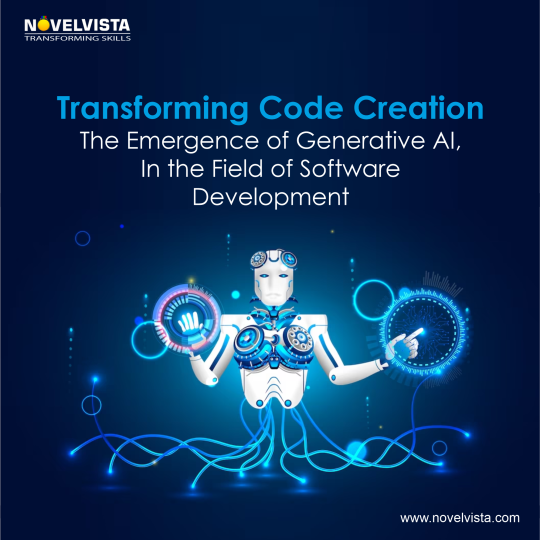
#generative ai for Software Development#Generative AI in Software Development#Generative AI software development
0 notes
Text
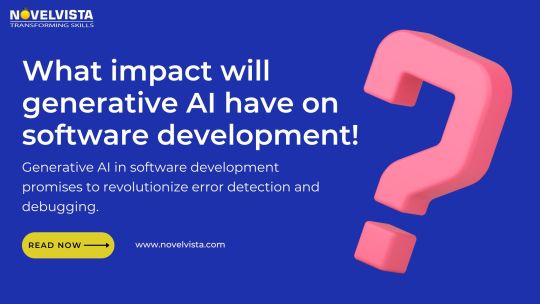
Generative AI is poised to significantly impact the field of software development, bringing about transformative changes and innovative approaches. By integrating Generative AI into software development processes, we can expect a profound shift in how developers create, test, and deploy software applications.
#generative ai for Software Development#Generative AI in Software Development#Generative AI software development#software development
0 notes
Text
#Certifications in Generative AI#Generative AI#Generative AI In Business#Generative AI In Cybersecurity#Generative AI In Finance And Banking#Generative AI In HR & L&D#Generative AI In Marketing#Generative AI In Project Management#Generative AI In Retail#Generative AI In Risk And Compliance#Generative AI In Software Development#Generative AI Professional Certification
1 note
·
View note
Text
AI App for head/face swapping?
Can anyone recommend an App for head and face swapping? Been using FaceApp and Vidnoz with mixed results. Is there one that uses AI?
#stolen identity#twin#lookalike#male transformation#app development#software#artificial intelligence#ai generated
9 notes
·
View notes
Text
#ai#image search#free ai tools#free business tools#ai art#ai generated#ai image#artifical#artifical intelligence#ai artwork#ai software development#ai software engineer
9 notes
·
View notes
Text
#image search#ai#ai art#ai artwork#ai generated#ai image#ai software development#ai software engineer#artifical#free ai tools#artifical intelligence
8 notes
·
View notes
Note
I know you're on paternity leave so feel free to ignore this if you don't want to think about it, but has there been any progress on open-sourcing Tumblr's front-end? Inquiring minds would like to know
i hadn’t seen any progress on it before i left. there’s a strong willingness to do it, it’s just a big task to get it open-source-able in a sustainable way. a lot of our CI/CD processes rely on stuff that would need to be rebuilt from scratch, i think. totally doable, just not a priority.
but maybe there’s been progress since i left, i dunno! 🤞
#open source#tumblr development#paternity leave#front end#software sustainability#continuous integration#ai generated tags
17 notes
·
View notes
Text
Project update
In June, when I started the jolt-jni open-source software project, I considered it a subsidiary project. However, it proved so absorbing that it soon soaked up most of my attention, leaving little for all my other projects.
This is surprising, since unlike most of my projects, it has no graphical component (yet) meaning no satisfying CGI images to enjoy (and perhaps share on social media).
Also unlike most of my projects, I was coding it from scratch, yet constrained by a preexisting API. In practice, that meant writing a ton of boring boilerplate. Prior to this I'd been scornful of the idea of using AI to generate code. But for generating boilerplate code, I can see that mechanical aids have their place.
Now that the library is about 80% complete, I've turned more of my attention to testing. My progress (measured in lines of code) is much slower. Some days I delete more code than I add. The good news is, I enjoy troubleshooting far more than coding.
For the record, here are the current statistics:
+ 1472 commits
+ Overall 48K lines of code (excluding comments and blanks)
+ 29K lines of Java (including 8K lines of tests and examples)
+ 17K lines of C++
#open source#software development#coding#java#c++#troubleshooting#api#current project#library#generative ai
2 notes
·
View notes
Text
Embracing the Revolution: Generative AI and Custom Software Development
Generative AI represents a paradigm shift in custom software development, offering unprecedented opportunities for innovation, efficiency, and creativity. By harnessing the power of AI algorithms, developers can accelerate the coding process, explore new design possibilities, and deliver highly customized solutions tailored to individual needs. As we embark on this journey of technological advancement, it's essential to embrace the transformative potential of generative AI while upholding ethical principles and ensuring inclusive and responsible development practices.
#Software Development#Custom Software Development#artificial intelligence#software engineering#AI#generative AI#ai algorithms#Revolution#technology#machine learning#programming
2 notes
·
View notes
Text
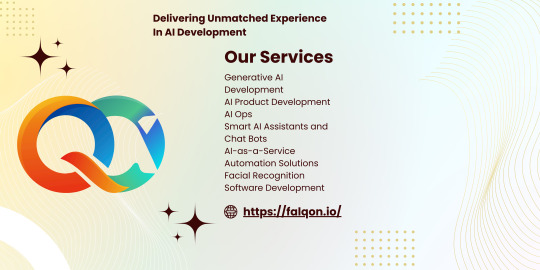
artificial intelligence| ai development companies| ai in business| ai for business automation| ai development| artificial intelligence ai| ai technology| ai companies| ai developers| ai intelligence| generative ai| ai software development| top ai companies| ai ops| ai software companies| companies that work on ai| artificial intelligence service providers in india| artificial intelligence companies| customer service ai| ai model| leading ai companies| ai in customer support| ai solutions for small business| ai for business book| basic knowledge for artificial intelligence| matching in artificial intelligence|
#artificial intelligence#ai development companies#ai in business#ai for business automation#ai development#artificial intelligence ai#ai technology#ai companies#ai developers#ai intelligence#generative ai#ai software development#top ai companies#ai ops#ai software companies#companies that work on ai#artificial intelligence service providers in india#artificial intelligence companies#customer service ai#ai model#leading ai companies#ai in customer support#ai solutions for small business#ai for business book#basic knowledge for artificial intelligence#matching in artificial intelligence
2 notes
·
View notes
Text
What impact will generative AI have on software development!
Generative AI is poised to significantly impact the field of software development, bringing about transformative changes and innovative approaches. By integrating Generative AI into software development processes, we can expect a profound shift in how developers create, test, and deploy software applications. One of the key impacts of Generative AI for software development is the enhancement of coding efficiency. Read More!
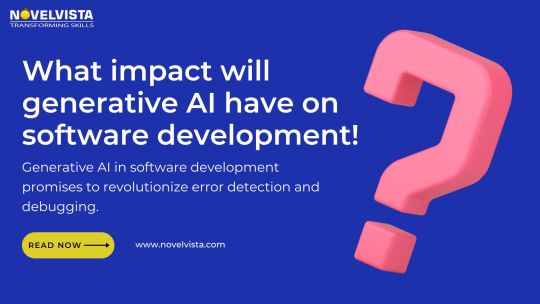
#generative ai for Software Development#Generative AI in Software Development#Generative AI software development#software development
0 notes
Text
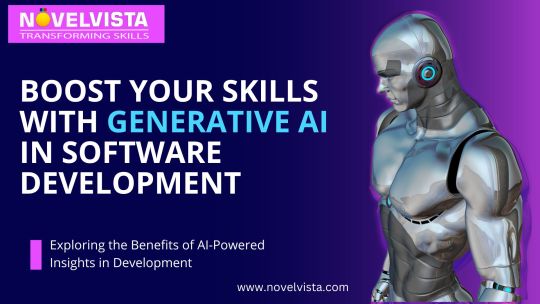
Enhance your software development expertise with our comprehensive course on Generative AI in Software Development. Delve into advanced techniques of generative AI to automate coding tasks, generate innovative code solutions, and streamline development processes. This course is tailored for ambitious developers eager to integrate AI into their projects for increased efficiency, creativity, and problem-solving capabilities. Embrace the future of software development with generative AI and stay ahead in the ever-evolving tech landscape. Read More!
#generative ai for Software Development#Generative AI in Software Development#Generative AI software development#software development
0 notes
Text
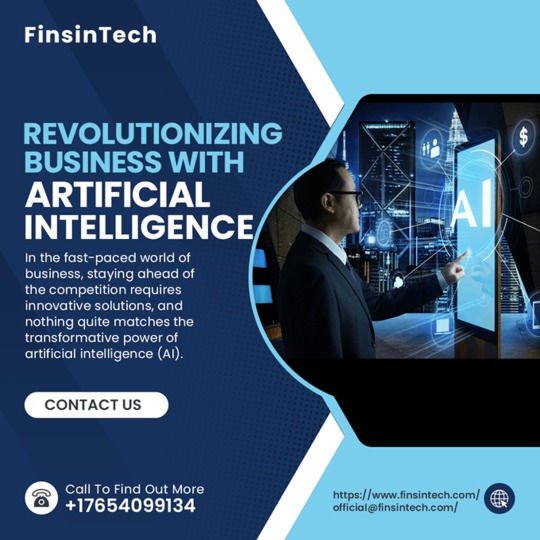
Release the Power of Innovation: A FinsinTech Guide to iOS App Development
The digital landscape is brimming with possibilities, and at the forefront of this revolution lies the power of mobile applications. In this dynamic space, iOS app development reigns supreme, offering unparalleled user experiences and access to a loyal and engaged audience.
If you're a business owner or entrepreneur seeking to capitalize on the immense potential of iOS, FinsinTech is your ideal partner. We're a leading iOS application development company with expertise and a passion for crafting intuitive, user-centric applications that drive engagement and success.
Why Choose FinsinTech for Your iOS App Development Needs?
Unwavering Expertise: Our team of seasoned iOS developers possesses in-depth knowledge of the latest Apple technologies, frameworks, and best practices. We constantly evolve, embracing the newest advancements to deliver cutting-edge solutions that exceed expectations.
Strategic Vision: We do more than just code. To develop an iOS app that flawlessly matches your unique vision, we thoroughly investigate your target market, company goals, and industry trends. We believe in strategic partnerships, working with you to bring your app to life.
Innovation at its Core: We're driven by a relentless pursuit of innovation. Strategic Vision: We do more than just code. To ensure that the iOS app we develop for you precisely matches your unique vision, we thoroughly investigate your target market, business goals, and industry trends.
Unmatched Quality: We take immense pride in our commitment to quality. Our rigorous development process ensures robust, secure, and scalable iOS apps that stand the test of time. We employ stringent testing methodologies to guarantee seamless performance and user satisfaction.
A Collaborative Journey: We believe in open communication and transparency. We keep you informed throughout development, ensuring you're involved and empowered at every step. Your feedback is invaluable, and we actively incorporate it to refine and perfect your iOS app.
From Concept to App Store: Our iOS Application Development Process Finding your vision, target market, and specific needs are the first steps in the discovery and planning process. We uncover opportunities and potential difficulties by doing in-depth competitor and market research.
Wireframing & Prototyping: We translate your vision into tangible form, creating wireframes and prototypes that illustrate the app's user interface and functionality. This collaborative process allows for iterative refinement and ensures we're on the same page.
Development & Design: Our expert developers bring your app to life, using the latest Apple technologies and best practices to craft a secure, scalable, and efficient application. Our design team prepares a stunning, intuitive user interface that delights your users.
Testing & Quality Assurance: We employ rigorous testing methodologies to identify and address bugs or issues throughout the development process. We ensure your app is thoroughly tested for performance, compatibility, and security before launch.
App Store Launch & Optimization: We walk you through the software Store submission process, ensuring your software complies with Apple's requirements and gets the most exposure possible.
We also provide ongoing optimization strategies to improve your app's ranking and user acquisition.
FinsinTech: Your Trusted Partner in iOS App Development Success
At FinsinTech, we believe that iOS mobile app development is more than just lines of code. It's about crafting experiences that connect, engage, and empower users. We are committed to assisting companies of all kinds in realizing the enormous potential of iOS and accomplishing their digital objectives. So, if you're ready to embark on your iOS app development journey, FinsinTech is your ideal companion. We're not just developers but your strategic partners, committed to your success.
Contact us today for a free consultation, and let's discuss how we can transform your vision into a thriving iOS app.
Let's create the next big thing in the iOS app universe!
We hope this blog post has been informative and insightful. If you have any questions about iOS mobile app development or FinsinTech's services, please don't hesitate to contact us.
We look forward to hearing from you!
#ecommerce#seo services#ai generated#ai#artificial intelligence#finsintech#ios app development#web app development#custom application#custom software development
3 notes
·
View notes